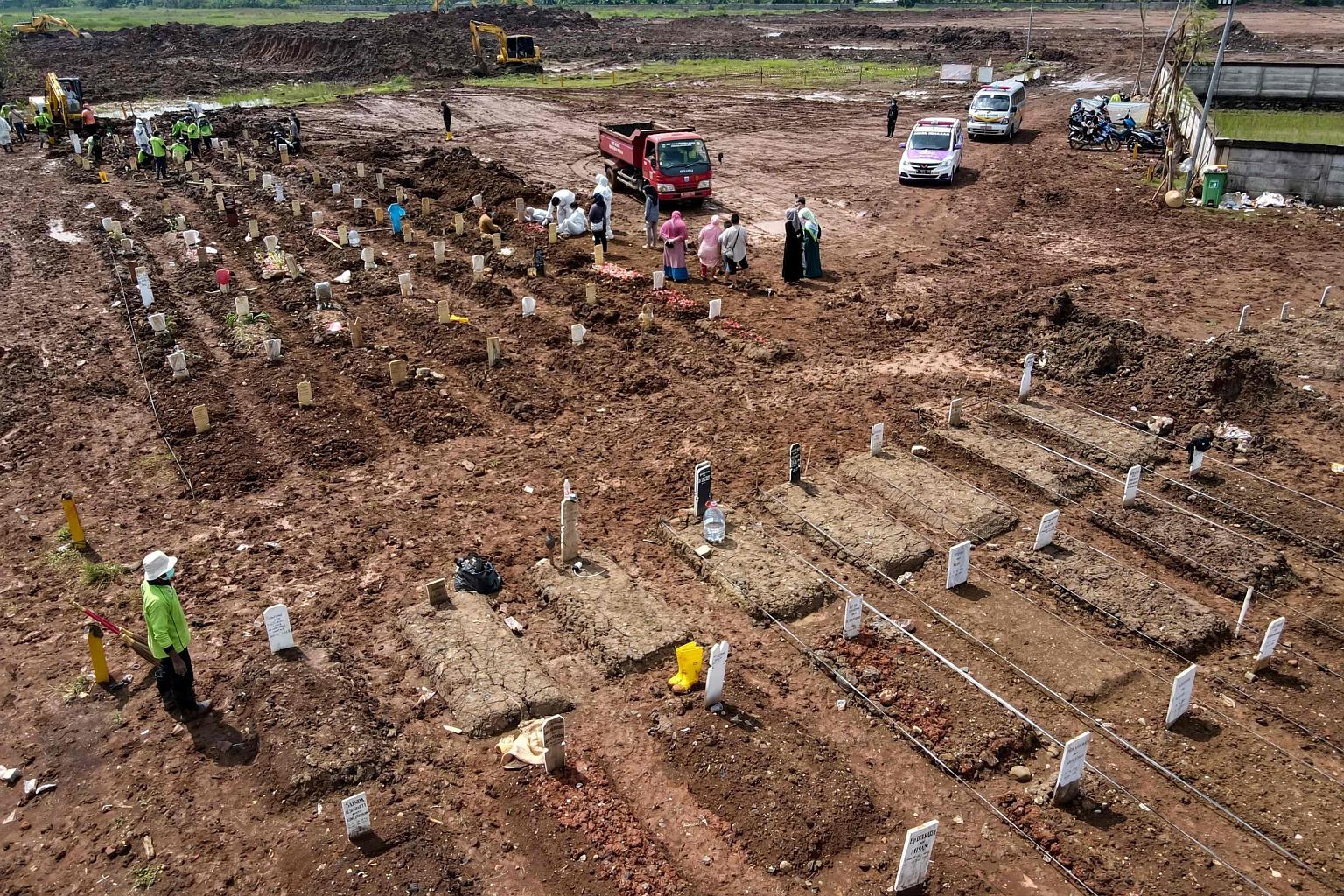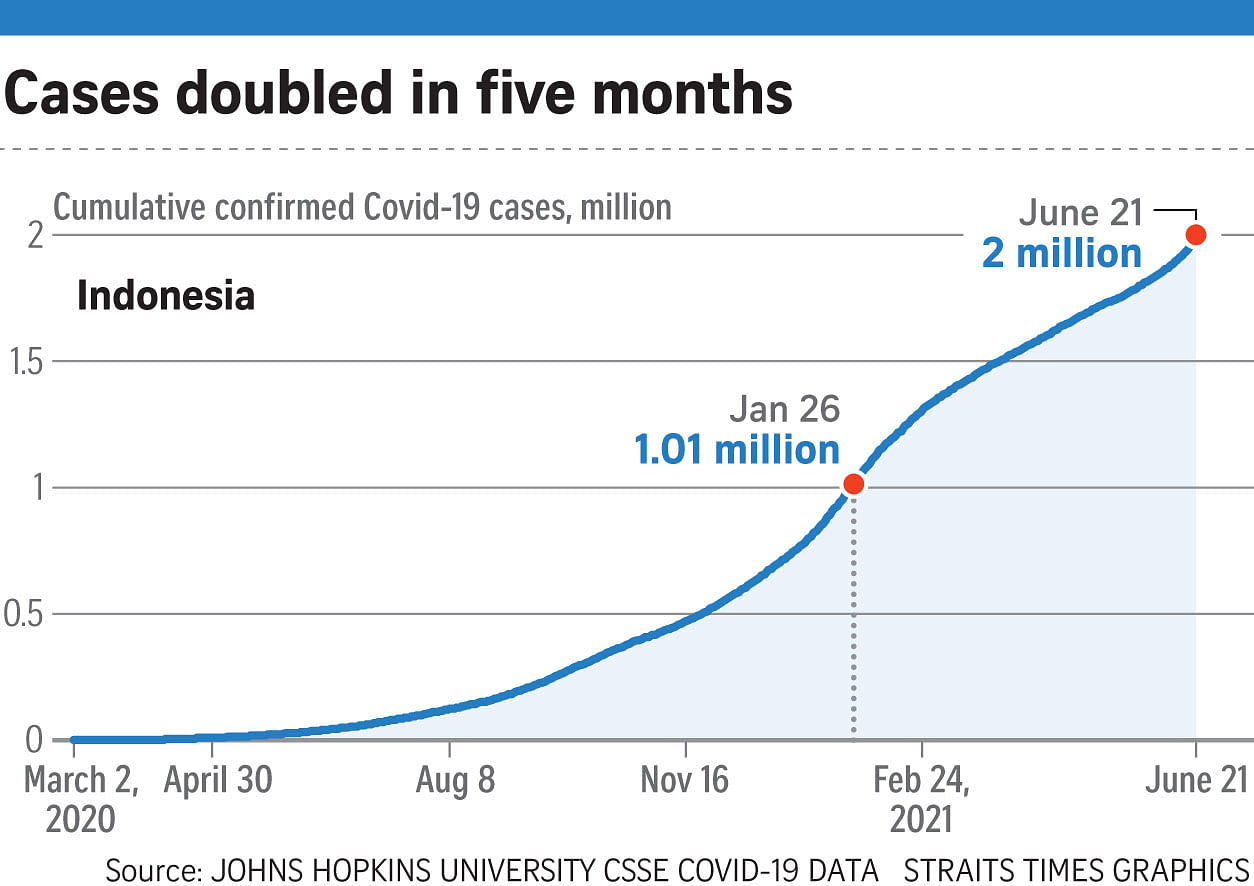Coronavirus: Asia
Indonesia imposes new restrictions in 'red zones'
But many feel large-scale lockdown is needed as cases in country cross two-million mark
Sign up now: Get insights on Asia's fast-moving developments

A funeral at a cemetery for Covid-19 victims in Jakarta yesterday. Official figures show Indonesia recorded 14,536 new infections yesterday, taking the number of overall cases past the two-million mark, and with nearly 55,000 deaths among a population of nearly 270 million.
PHOTO: AGENCE FRANCE-PRESSE
Covid-19 infections have continued to soar in Indonesia, with the country yesterday reporting the highest daily increase in cases since the beginning of the pandemic, prompting the government to announce a tightening of restrictions but only in the badly affected areas for two weeks.
It ignored pleas by doctors and regional leaders for a large-scale lockdown to deal with the more contagious Delta variant of the coronavirus.
Official figures showed the country recorded 14,536 new infections yesterday, taking the number of overall cases past the two-million mark, and with nearly 55,000 deaths among a population of nearly 270 million.
The surge in cases has also been blamed on people ignoring a government ban on travel across the sprawling archipelago during the recent Hari Raya holidays.
"It's starting to bubble up to the surface, like a time bomb," Dr Windhu Purnomo, an epidemiologist at Indonesia's Airlangga University, was quoted as saying by Agence France-Presse.
"This is just the beginning. Depending on how things are handled, we could end up with a major explosion like in India," he added.
Healthcare facilities are already being stretched to the limit, particularly in the most populous regions such as Jakarta, the capital, and the province of West Java which have reported 90 per cent hospital bed occupancy ratio. Many other regencies and cities have reported a bed occupancy ratio of 70 per cent.
Indonesia has thus far adopted a colour-coded lockdown regime with regions affected by more infections being labelled red zones and subject to tougher curbs. Those with fewer Covid-19 cases are labelled orange and yellow.
Refraining from taking any drastic steps, President Joko Widodo's administration yesterday announced new restrictions in the red zones from today.
These require restaurants, cafes and shopping malls in the regions with higher infection rates to close earlier, by 8pm. Patrons will be limited to 25 per cent of the capacity of establishments.
Three-quarters of those employed in the non-essential sector must work from home and the rest, who have to go to the office, must do so in a staggered manner.
Religious activities at all houses of worship in red zones will be suspended and tourist attractions closed.
However, many believe that the colour-coded system - widely described throughout the country as "micro lockdowns" - is not working well.
The governor of Yogyakarta province, Sultan Hamengkubuwono X, said last Friday that such localised lockdowns had proved to be unsatisfactory, stressing that a large-scale lockdown was necessary to deal with the situation.
The Jakarta-based Centre for Indonesia's Strategic Development Initiatives, a think-tank, and a volunteer group, LaporCovid-19, have filed an open letter, which has been supported by noted epidemiologists including Dr Dicky Budiman from Griffith University and various civil society groups, urging President Widodo to put aside concerns about the economy, investments and infrastructure projects for the next three months.
"In the past days, we have witnessed a public health crisis with a greater magnitude than what we experienced several months ago. The situation we are facing now is going to get worse in the coming days," the letter says.
It says the government had been relatively slow in anticipating the increasing spread of new variants from other countries, adding that its efforts at managing have been sporadic and not optimal.

Responding to a media query on the health-comes-first-economy-second suggestion, Health Minister Budi Sadikin told a press briefing yesterday that Mr Widodo has all along emphasised both.
Commenting on the rising pressure on healthcare facilities in Jakarta, Mr Budi said the capital had 37,456 hospital beds, with 17,752 or 47 per cent of them reserved for Covid-19 cases. Nearly 90 per cent of these reserved beds were occupied as of yesterday.
Mr Budi also said the government could increase the quota for Covid-19 beds to 50 per cent.


